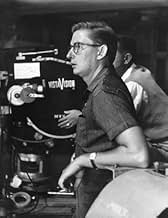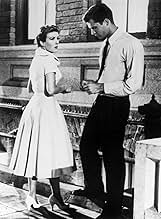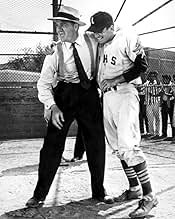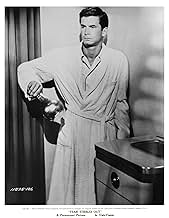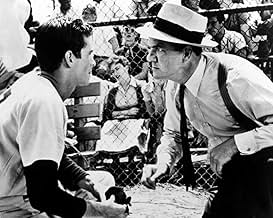ÉVALUATION IMDb
6,9/10
2,3 k
MA NOTE
La vraie histoire de Jimmy Piersall, qui a lutté contre la maladie mentale avant de devenir une vedette du baseball.La vraie histoire de Jimmy Piersall, qui a lutté contre la maladie mentale avant de devenir une vedette du baseball.La vraie histoire de Jimmy Piersall, qui a lutté contre la maladie mentale avant de devenir une vedette du baseball.
- Prix
- 1 nomination au total
John Aberle
- Ballplayer
- (uncredited)
Eric Alden
- Policeman
- (uncredited)
Heather Ames
- Nurse
- (uncredited)
Sam Balter
- Broadcaster
- (voice)
- (uncredited)
Mary Benoit
- Nurse
- (uncredited)
John Benson
- Reporter
- (uncredited)
Don Brodie
- Reporter Evans
- (uncredited)
Richard Bull
- Reporter Slade
- (uncredited)
Bart Burns
- Joe Cronin
- (uncredited)
Edd Byrnes
- Boy in Car Assisting Jimmy Up Stairway
- (uncredited)
Wade Cagle
- Intern
- (uncredited)
Keith Coyne
- Baby
- (uncredited)
Avis en vedette
True story of Boston Red Sox outfielder Jimmy Piersall, Anthony Perkins, struggle with mental illness by desperately wanting to please his domineering father John, Karl Malden, to be a big league baseball player. At the same time Jimmy confronted his insecurities of not having what it takes to be one. Growing up as a boy in Waterbuary Ct. Jimmy always dreamed of playing for the Red Sox not just to play professional baseball but to be able to get out of the poverty that he and his parents were stuck in all their lives.
Jimmy's father John played semi-pro ball as a young man but never had the talent to play in the big leagues and put all his effort and drive to see that Jimmy would get the chance, playing professional baseball, that he never got. Helpful at first but as John's obsession in getting Jimmy to make the grade started to take it's toll on the sensitive young man, As he finally reached his goal of making the team, fear set in on Jimmy fear that he'll fail his dad and himself. That fear lead Jimmy to have a mental breakdown during a night-game in Fenway Park after hitting an inside-the-park home run.
"Fear Strikes Out" covers Jimmy Piersall's life from a 12 year old boy in Waterbuary Ct. through his being committed into a institution for treatment of his mental illness due to the his fear that he'll never be the person that his father wanted him to be. As well as the fear that he wouldn't be able to care and provide for his parents and newlywed wife Mary, Norma Moore, and their new born daughter Eileen.
Being looked after by Dr. Brown, Adam Williams, at the institution it's painful to see Jimmy completely lose it and end up looking and acting like a person who's been lobotomized. Dr. Brown get's Jimmy to respond to his treatment by showing him the kindness and understanding that his father lacked for Jimmy during his formative years. That caused him to not just enjoy playing baseball but to become obsessed by it in wanting to fulfill the dreams that his dad had for him.
This pressure built up over the years as Jimmy worked hard to make the majors and play along the likes of baseball greats like Ted Williams Mickey Mantle and Willie Mays. There was a terrible price to all that and that price was that no matter how hard Jimmy tried he was never good enough, or as good as he could be, in the eyes of his dad John Piersall.
It turned out that it was not just Jimmy who needed mental therapy but his father as well in understanding that his son was a human being not a machine who's feeling had to be taken into account. John Piersall was relentlessly driving Jimmy to make the grade as a big league baseball player not caring, or noticing, that he was driving Jimmy straight into a nervous breakdown. Even Boston Red Sox manager Joe Cronin, Bart Burns, was more receptive to Jimmy's impending mental collapse then his father. Cronin did everything he could, through the Red Sox organization, to help Jimmy with desperately needed professional help that Jimmy's father had no idea that his son needed.
The best part of the movie "Fear Strikes Out" was when John Piersall finally understood what he did to his son Jimmy in pushing him like he did. Later at the institution John was accepted by Jimmy who for a time wanted to have nothing to do with him. For once just being his father, not a hard as nails lion trainer, the two had an friendly but emotional game of catch.
Jimmy did in the end recover form his personal demons and went on to be an All-Star outfielder for Boston Cleveland and the New York Mets, among outer teams he played for. Despite his fine record as a professional baseball player Jimmys overcoming the fear that almost destroyed him was by far Piersall's greatest achievement.
Jimmy's father John played semi-pro ball as a young man but never had the talent to play in the big leagues and put all his effort and drive to see that Jimmy would get the chance, playing professional baseball, that he never got. Helpful at first but as John's obsession in getting Jimmy to make the grade started to take it's toll on the sensitive young man, As he finally reached his goal of making the team, fear set in on Jimmy fear that he'll fail his dad and himself. That fear lead Jimmy to have a mental breakdown during a night-game in Fenway Park after hitting an inside-the-park home run.
"Fear Strikes Out" covers Jimmy Piersall's life from a 12 year old boy in Waterbuary Ct. through his being committed into a institution for treatment of his mental illness due to the his fear that he'll never be the person that his father wanted him to be. As well as the fear that he wouldn't be able to care and provide for his parents and newlywed wife Mary, Norma Moore, and their new born daughter Eileen.
Being looked after by Dr. Brown, Adam Williams, at the institution it's painful to see Jimmy completely lose it and end up looking and acting like a person who's been lobotomized. Dr. Brown get's Jimmy to respond to his treatment by showing him the kindness and understanding that his father lacked for Jimmy during his formative years. That caused him to not just enjoy playing baseball but to become obsessed by it in wanting to fulfill the dreams that his dad had for him.
This pressure built up over the years as Jimmy worked hard to make the majors and play along the likes of baseball greats like Ted Williams Mickey Mantle and Willie Mays. There was a terrible price to all that and that price was that no matter how hard Jimmy tried he was never good enough, or as good as he could be, in the eyes of his dad John Piersall.
It turned out that it was not just Jimmy who needed mental therapy but his father as well in understanding that his son was a human being not a machine who's feeling had to be taken into account. John Piersall was relentlessly driving Jimmy to make the grade as a big league baseball player not caring, or noticing, that he was driving Jimmy straight into a nervous breakdown. Even Boston Red Sox manager Joe Cronin, Bart Burns, was more receptive to Jimmy's impending mental collapse then his father. Cronin did everything he could, through the Red Sox organization, to help Jimmy with desperately needed professional help that Jimmy's father had no idea that his son needed.
The best part of the movie "Fear Strikes Out" was when John Piersall finally understood what he did to his son Jimmy in pushing him like he did. Later at the institution John was accepted by Jimmy who for a time wanted to have nothing to do with him. For once just being his father, not a hard as nails lion trainer, the two had an friendly but emotional game of catch.
Jimmy did in the end recover form his personal demons and went on to be an All-Star outfielder for Boston Cleveland and the New York Mets, among outer teams he played for. Despite his fine record as a professional baseball player Jimmys overcoming the fear that almost destroyed him was by far Piersall's greatest achievement.
10mercury4
This is a great movie. I'm glad I made a special trip to the store to find this. I now have the new DVD. I remember catching it one day on Encore or maybe AMC. I thought what I saw of it was great. But the whole time I kept thinking of Perkins as Norman Bates. After I saw the whole thing for the very first time I thought of Tony Perkins in a whole new way. The scenes of him losing it and the scene where he stands up to his father are great. Good baseball scenes too. Very very good acting by Perkins. Malden was good too as Jimmy Piersall's over demanding father. Norma Moore is good as Piersall's wife Mary. This movie has great music by Elmer Bernstein, who's music is always great. The theme really sets the tone for a dramatic movie. This is a great sports movie, biopic, and drama. So be sure not to miss it. I recommend it to everyone. It shows that becoming a professional ball player, or in this case, an all-star outfielder for the Boston Red Sox, doesn't come easy. My favorite part is where Piersall puts on his hat and walks out to go back to playing baseball for the first time after his recovery. That was a very inspiring scene. See this movie and you will love it. There is nothing to hate about it. Believe me, you will not be disappointed
If this story were filmed today, the treatment would be much more stark and realistic. But for a film in the mid-50s, it provided quite a punch in conveying the agony of growing up with a loving but very demanding father. When I saw it in the theater, I never questioned Anthony Perkins as a teenager in the first part; today, this is much more difficult to swallow. Even though dated somewhat, the film is still worth a watch.
Karl Malden is excellent as a father driven by his own sense of failure to attempt to live vicariously through his son. As a result, he literally orchestrates his son's life. Never accepting the `glory' of the moment, he places constant expectations and demands on his son. Possibly this is Malden's best role.
Tony Perkins has some fine moments of anguish and neuroticism as the ball player, Jimmy Piersall. One scene between his father and him after his breakdown is superbly acted with Perkins running through a panoply of emotions. That this emotional turmoil is somewhat subdued is to the credit of the film. Norma Moore gives a competent and rather understated performance as his wife. The doctor, played by Adam Williams, is appropriately comforting, but he's not up to delivering the big line, especially in his intense scene with Malden. Regretfully, Perry Wilson as Piersall's submissive mother, didn't have more of a role.
Some very nice photography using the angularity of steps and bleachers and railroad stations conveys the underlying jaggedness and tension of emotions. Elmer Bernstein's soundtrack is effective in supporting the mood of the film.
Karl Malden is excellent as a father driven by his own sense of failure to attempt to live vicariously through his son. As a result, he literally orchestrates his son's life. Never accepting the `glory' of the moment, he places constant expectations and demands on his son. Possibly this is Malden's best role.
Tony Perkins has some fine moments of anguish and neuroticism as the ball player, Jimmy Piersall. One scene between his father and him after his breakdown is superbly acted with Perkins running through a panoply of emotions. That this emotional turmoil is somewhat subdued is to the credit of the film. Norma Moore gives a competent and rather understated performance as his wife. The doctor, played by Adam Williams, is appropriately comforting, but he's not up to delivering the big line, especially in his intense scene with Malden. Regretfully, Perry Wilson as Piersall's submissive mother, didn't have more of a role.
Some very nice photography using the angularity of steps and bleachers and railroad stations conveys the underlying jaggedness and tension of emotions. Elmer Bernstein's soundtrack is effective in supporting the mood of the film.
This is not what one would call a pleasant film to watch particularly about Baseball. It tells the true story of former major league ball player Jim Piersall of the Boston Red Sox and his eventual mental breakdown. While certain events are not exactly the way they took place the story nonetheless sticks pretty much to fact. Anthony Perkins puts in a dynamic performance as Piersall. A kid who likes baseball but is driven to madness by his domineering perfection minded father played by Karl Malden. Also included in the cast is Norma Moore as Jims devoted wife Mary and Adam Williams as the psychiatrist Doctor Brown.
The first half of the picture deals with Piersall growing up practicing and playing baseball always under the scrutiny of his father. Whatever Jim did on the playing field it could always have been done better according to his Dad. The second half of the film deals with Piersalls mental breakdown and subsequent treatment and recovery. While watching a ball game on TV he makes remarks that his doctor picks up on and uses to unlock the reason why he cracked up. These same circumstances are no doubt still occurring today as many parents push their children relentlessly in everything from sports to academics to beauty pageants. Jim Piersalls story fortunately became a book and later this fine film that perhaps has and will continue to serve as a message to those who watch it. Whether you're a baseball fan or not this is a movie to be seen.
The first half of the picture deals with Piersall growing up practicing and playing baseball always under the scrutiny of his father. Whatever Jim did on the playing field it could always have been done better according to his Dad. The second half of the film deals with Piersalls mental breakdown and subsequent treatment and recovery. While watching a ball game on TV he makes remarks that his doctor picks up on and uses to unlock the reason why he cracked up. These same circumstances are no doubt still occurring today as many parents push their children relentlessly in everything from sports to academics to beauty pageants. Jim Piersalls story fortunately became a book and later this fine film that perhaps has and will continue to serve as a message to those who watch it. Whether you're a baseball fan or not this is a movie to be seen.
This a very interesting, but not totally factual, account of the life of Jimmy Piersall. Piersall was a popular player with the Boston Red Sox. His antics on and off the field are now legendary. Piersall fell in love with baseball at a young age, but his domineering father forced Jimmy to not only achieve, but to play to perfection. Mr. Piersall's constant manipulating can be traced to his son's mental breakdown.
Anthony Perkins puts in a dedicated performance as Jimmy Piersall. Karl Malden excelled as the relentless Mr. Piersall. Also in the cast are Bart Burns, Norma Moore and Adam Williams.
This is a very stark and interesting movie, just don't take all the content as gospel. A baseball fan's delight.
Anthony Perkins puts in a dedicated performance as Jimmy Piersall. Karl Malden excelled as the relentless Mr. Piersall. Also in the cast are Bart Burns, Norma Moore and Adam Williams.
This is a very stark and interesting movie, just don't take all the content as gospel. A baseball fan's delight.
Le saviez-vous
- AnecdotesThe real Jimmy Piersall disowned the movie due to its distortion of the facts. Based on the success of his autobiography and the movie, Piersall penned a second book in 1985 called The Truth Hurts, which detailed his ousting from the White Sox organization.
- GaffesClose-up shots of Jimmy Piersall playing shortstop and right field reveal a low outfield wall backed by trees in the background. These games were supposed to be in Fenway Park, which would have a high left field wall and bleachers in right field.
- Citations
Jim Piersall: I don't care what happens. I love you Mary!
- ConnexionsFeatured in Diamonds on the Silver Screen (1992)
Meilleurs choix
Connectez-vous pour évaluer et surveiller les recommandations personnalisées
- How long is Fear Strikes Out?Propulsé par Alexa
Détails
- Date de sortie
- Pays d’origine
- Langue
- Aussi connu sous le nom de
- The Jim Piersall Story
- Lieux de tournage
- société de production
- Consultez plus de crédits d'entreprise sur IMDbPro
- Durée1 heure 40 minutes
- Couleur
- Rapport de forme
- 1.85 : 1
Contribuer à cette page
Suggérer une modification ou ajouter du contenu manquant

Lacune principale
By what name was Fear Strikes Out (1957) officially released in Canada in English?
Répondre

